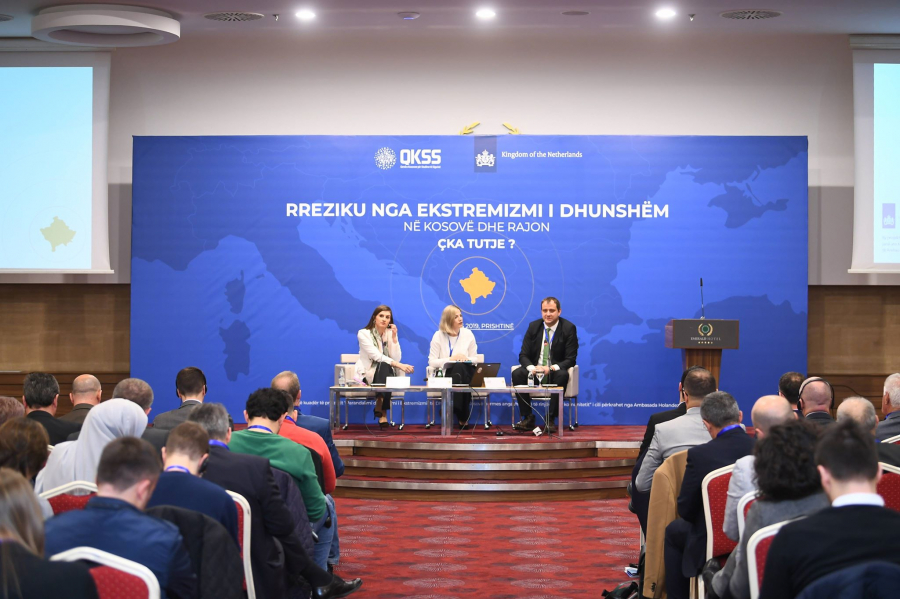15/03/2019

Kosovar Centre for Security Studies (KCSS) on 13th of March 2019, has organized the regional conference "Threats from violent extremism in Kosovo and the region – the way forward" supported by the Embassy of the Kingdom of the Netherlands in Kosovo. m
In the framework of this conference, KCSS has launched the report "Countering the myths of IS. How to counter the IS narratives online? The case of Albanian-speaking countries.” Author of this report are: Vese Kelmendi, and Rudinë Jakupi, Researcher at KCSS.
This conference was divided into three discussion panels.
The first panel of the regional conference was "Threats from violent extremism in Kosovo and the region - what's next?" together with National Coordinators of CT/CVE strategies for the prevention of violent extremism from Kosovo, Northern Macedonia and Albania.
- Mr. Agron Sojati, National CVE coordinator of Albania
- Mr. Borce Petrevski, National CVE coordinator of North Macedonia
- Mr. Fatos Makolli, National CVE coordinator of Republic of Kosovo
Panel was moderated by Mr. Mentor Vrajolli, KCSS
The second panel, was composed by the mayors of four out of six Municipalities that were were targeted through project, to discuss the “Community responds against violent extremism and radicalization in Kosovo- Role of local authorities" and measures taken by local authorities to prevent such a phenomenon in municipalities such as Pristina , Mitrovica, Skenderaj, Drenas, Obiliq and Lipjan.
Part of the panel were:
-Mr. Bekim Jashari, Mayor of Municipality of Skenderaj
-Mr. Ramiz Lladrovci, Mayor of Municipality of Drenas
-Mr. Faruk Mujka, Deputy Mayor of Municipality of Mitrovica
-Mr. Fauz Xhemajli, Deputy Mayor of Municipality so Lipjan
Panel was moderated by Mrs. Donika Emini, KCSS.
The last panel of this conference "New trends and threats from violent extremism and terrorism" gathered regional experts from Republic of North Macedonia, Bosnja and Hercegovina and Kosovo to discuss trends and new challenges of violent extremism. Given the importance of inclusiveness and institutional co-operation with non-governmental organizations, this panel summarizes the measures that all actors must undertake to combat and prevent phenomena such as violent extremism and returned foreign fighters from conflict zones.
Part of the panel were:
- Mr. Filip De Ceuninck, Regional Counter-terrorism and Security Advisor European Union Delegation to Bosnia and Herzegovina
-Ms. Meral Musli Tajroska - Spokesperson Women without Borders, Expert The Radicalisation Awareness Network (RAN)
- Mr. Skënder Perteshi, Coordinator of CVE Programe at KCSS
Panel was moderated by Mrs. Rudine Jakupi, KCSS.
The recommendations that are highlighted in this conference from panelists and participants are the cooperation between local and central level in activates that aim to prevent violent extremism and radicalization. Also, it has been emphasized the need for governments to launch joint counter-messaging strategies. Messages should avoid creating stigma and isolation and should be directed in a way that creates a sense of community and inclusion. Civil society organizations, including local organizations, should develop digital education platforms, where youth can be exposed to different ideas and alterations that may also create their critical thinking in issues such as democracy, religion, human rights etc. Moreover, the main challenges in regional context remain the reintegration programs of foreign fighters, as well as women and minors who are expected to return from conflict zones.
Present at this conference were representatives of Embassies, representatives from security institutions, representatives from the local level, representatives of civil societies and students.
This conference was organized in the framework of the project: "Preventing and Countering Violent Extremism in Kosovo through Involvement of Youth and the Community" and marking the conclusion of the 18 month long project supported by the